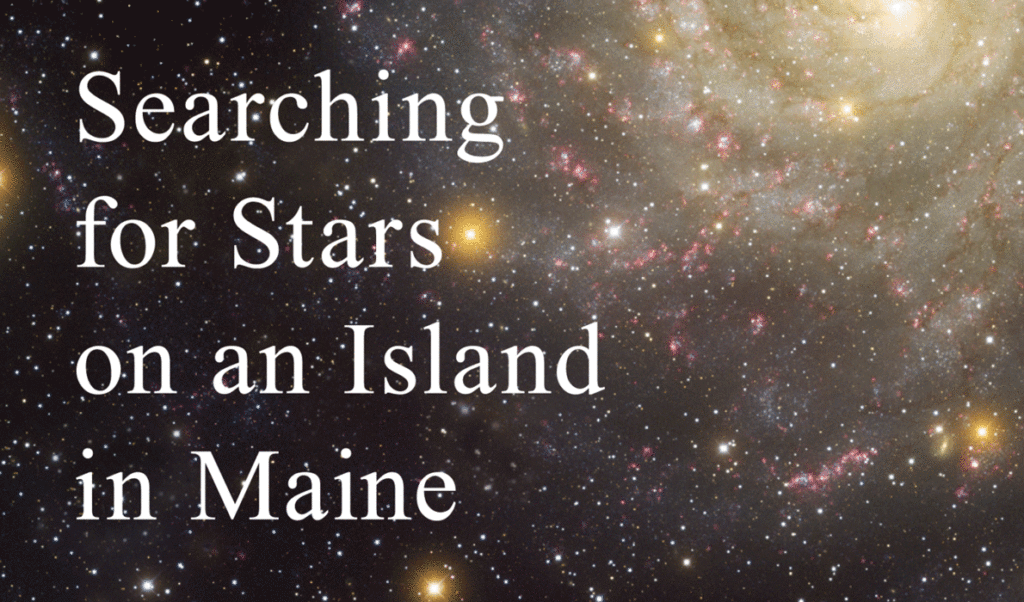Searching for Stars on an Island in Maine,by Alan Lightman; Pantheon Books, New York, 2018
Review by Dana Wilde
More than 60 years ago, the British physicist and novelist C.P. Snow stirred up an intellectual hornets nest in a magazine article, “The Two Cultures.” Science and the humanities, he said, could barely communicate with each other. They operated in completely different realms of discourse with completely different ideas of what constitutes knowledge. This abysmal cultural rift, Snow suggested, had profound moral implications.
Fast forward to the 2010s, and you find that the buzz Snow provoked never really quieted. But his observations have to some extent been taken to heart.
While in the 1950s Snow’s dual identity as physicist and novelist was unusual, Alan Lightman’s same background doesn’t seem strange at all. Already the author of fiction such as the novel Einstein’s Dreams, the MIT professor and Cal Tech-trained theoretical physicist turns his attention to the literary vogue for memoir in Searching for Stars on an Island in Maine, an effort to bridge the divide between science and the humanities or, more precisely, personal experience.
He approaches the problem in two basic ways, by explaining the history and elementary underpinnings of modern science, and by exploring the personal philosophical disturbances that ensued after he had a mystical experience one evening in a boat.
While motoring from his summer home on a small island (which turns out to be in Harpswell), Lightman is awed by the stars studding the dark sky. He shuts down his engine, reclines in the boat, and gazes upward. Then: “After a few minutes, my world had dissolved into that star-littered sky. The boat disappeared. My body disappeared. And I found myself falling into infinity. … I felt connected not only to the stars, but to all of nature, and of the entire cosmos.”
Although Lightman seems unaware of the extent to which this very experience has been recounted and discussed throughout human history, it is nonetheless a prototypical example of W.H. Auden’s description of the Vision of Dame Kind (or nature). Those few minutes in his boat were so powerful that they challenged Lightman’s long-held physicist’s assumptions about what’s real. In response, Lightman shapes a gratifyingly plain-spoken, genuinely inquiring effort to make sense of the paradox between what his science tells him and what his personal experience tells him.
The book rehearses standard popular accounts of the lives and works of Galileo, Einstein, and others, as well as the science of atoms, stars, subatomic particles, and the multiverse. Integrated between these rehearsals, he summarizes some Enlightenment-based philosophy on the topic of “absolutes” and “relatives” and tinkers with philosophical, religious, and psychological ideas about transcendence, natural beauty, and truth.
His basic conundrum derives from the intense sense of reality revealed in his experience of cosmic unity. In physics, if an object or event can be measured, then it’s real; if it can’t, then it’s not. The experience in the boat was intensely real, but utterly immeasurable.
Lightman points out, however, that science describes rather than defines reality, and this creates a kind of gray area where he can place the vexing problem of who the immaterial “I” is that experienced cosmic unity and that loves his family.
“Looking out on the water, I see a haze in the air, a softening of edges. I see ocean and sky and a few seagulls sailing through space. I think I’ve decided to sit here a while longer,” concludes the uncertain chapter “Certainty.”
At points, Lightman captures the sense of cosmic depth sometimes glimpsed by us all on summer days along the Maine coast, pointing to the intensity of feeling that exposes the boundary limits of rational science. In those passages, the pseudonymous “Lute Island” becomes a sort of objective correlative for the intersection of the physical world (that he measures) and the felt world (that his mind actually inhabits).
No epistemological problems are solved in Searching for Stars on an Island in Maine. But the effort to bridge the gap between the assumptions of science and direct personal experience is valiant. It remains, as C.P. Snow suggested, a critical perennial problem.
Dana Wilde, a former editor, college professor and literary scholar, lives in Troy and writes the Backyard Naturalist column for the centralmaine.com newspapers. He has written extensively on mystical experience. His recent book is “Summer to Fall: Notes and Numina in the Maine Woods,” available from North Country Press.





